Sports Drink Market Research, 2031
The global sports drink market size was valued at $13,668.70 million in 2021 and is projected to reach $21,969.70 million by 2031, registering a CAGR of 4.8% from 2022 to 2031.
Sports drink is a type of soft drink that is rich in carbohydrates (in the form of sugar), minerals, electrolytes, & flavorings; is alleged to optimize hydration before or after physical activity; and improve athletic performance. Main aim of these beverages is to fuel the essential organs which are working rigorously during activity and to supply carbohydrates & essential minerals to boost the overall recovery process during exercise. Optimal hydration is an essential consideration for athletic performance, and it involves activities before, during, and after exercise. Hence, adequate hydration not only provides health benefits but also facilitates maintaining athletic performance.
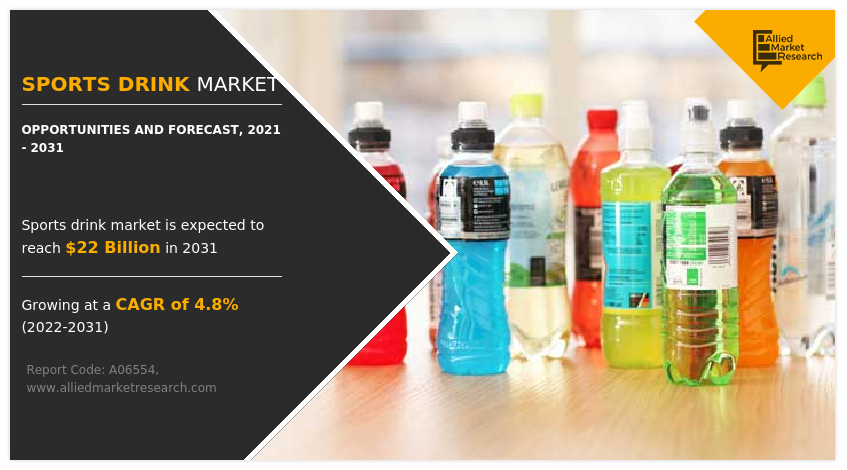
Market Dynamics
With increase in awareness about sports drinks, consumers are inclining toward isotonic, hypertonic, and hypotonic drinks to rehydrate the body which is expected to propel the sports drink market growth. The global sports drink industry is impacted profoundly by the outbreak of the coronavirus. The demand for sports drinks is expected to decline across the globe, owing to supply chain disruptions and implementation of stringent restrictions to follow social distancing & consistent lockdowns across the globe.
Consumers are actively focused on fitness & health. As a result, active & health-conscious consumers have shifted their preference toward natural alternatives from caffeinated and sugar-based energy drinks. Functional food possesses specific nutrients & supplements which improvise athletic performance and metabolism. Appropriate nutrition is an essential prerequisite for the effective improvement of athletic performance, conditioning, recovery from fatigue after exercise, and avoidance of injury. With increase in adoption of natural sports drinks, manufacturers are investing in R&D to offer innovative flavors to consumers. Hence, the demand for natural sports drinks is growing rapidly due to their nutritional properties such as electrolytes and nutrients.
Growth in inclination of the millennial population toward physical and fitness-related activities, rise in buying power, and willingness to pay for healthier alternatives are some of the major factors accelerating the demand for sports drinks. For instance, the data published by the International Health, Racquet & Sportsclub Association in October 2019 states that 76% of millennials are assessed to exercise at least once a week. In addition to this, this healthy drink provides several benefits, such as minimizing the risk of dehydration, and maintaining the balance of electrolytes in the body. Therefore, increase in awareness regarding the health benefits associated with the consumption of sports drinks among consumers is likely to augment the sports drink market growth.
Various manufacturers are focusing more on innovations and launching natural drinks with different flavors, which will meet up the nutritional demand of consumers. This innovation will simultaneously help many companies to increase their revenues, which, in turn, would drive the market growth. Powerade has expanded its product portfolio with two new zero-sugar innovations that offer functional hydration solutions. It launched POWERADE ULTRA, which includes branched-chain amino acids (BCAAs), creatine, vitamins B12, B6, and B3, and +50% more ION4 electrolytes compared to the original POWERADE. Thus, rise in focus of the manufacturers on innovative and healthy flavors in sports drinks is expected to fuel the growth of the market in the upcoming years.
The sports drinks market in Asia-Pacific offers lucrative growth opportunities for operating players, owing to an increase in awareness about sports drinks and its health benefits among the consumer. The increase in the adoption of sports drinks and the rise in health consciousness among consumers in developing countries such as China and India, majorly drive the growth of the sports drink market in Asia-Pacific. Moreover, an increase in awareness regarding sports drinks and their associated benefits has further led to the growth of the market. Moreover, countries in Latin America, such as Brazil, are anticipated to unfold attractive business opportunities, owing to an increase in awareness regarding sports drinks and their benefits.
There has been a great upsurge in the user base of different social media platforms and other types of internet websites, owing to the large-scale distribution of internet services across the globe. This user base consists of children, teenagers, middle-aged as well as the elderly population. Considering this, most of the engaged stakeholders in the sports drink market are moving on to digital forms for advertising & marketing that help to grow awareness regarding sports drinks. Conducting events & live sessions by various sports drinks brands on health & fitness and incorporating their products into such types of events to showcase their benefits help create a positive impression and spread awareness about the sports drinks in the minds of the consumers. It further helps the consumers interact with the company, which can further improve the image of the company in the minds of the people. The rise in the use of social media and digital marketing to increase awareness about sports drinks and their health benefits is expected to create growth opportunities for manufacturers in the sports drink market forecast period.
Sports drinks have gained massive popularity in the last few years, owing to which there has been a tremendous increase in the sale of such products. Due to the popularity and high sales revenue, many small companies or organizations have started producing low-quality versions of such products and started selling them with the sole purpose of gaining profits. These low-quality and counterfeit products contain sub-par ingredients and are often contaminated with allergens and harmful chemicals. The majority of these products are very dangerous if consumed, and can cause severe health problems. Furthermore, the packaging of such products is identical or very similar to branded products, making it difficult for the consumers to discern the original, branded products from their counterfeits, which poses a serious threat to the market. Thus, counterfeit & low-quality products are expected to hamper the growth of the market.
Segments Overview
The global sports drink market is segmented into type, packaging type, application, distribution channel, and region. By type, the market is divided into hypotonic, hypertonic, and isotonic. As per packaging type, the market is divided into PET bottles and cans. On the basis of application, the market is divided into athletes, casual consumers, and lifestyle users. According to the distribution channel, the market is divided into online and offline. The offline distribution channel is further divided into hypermarkets & supermarkets, convenience stores, specialty stores, and others. Region-wise, the sports drink market size is analyzed across North America (the U.S., Canada, and Mexico), Europe (Germany, France, Italy, Spain, UK, Russia, and rest of Europe), Asia-Pacific (China, Japan, India, South Korea, Australia, Thailand, Malaysia, Indonesia, and rest of Asia-Pacific), and LAMEA (Brazil, South Africa, Saudi Arabia, UAE, Argentina, and rest of LAMEA).
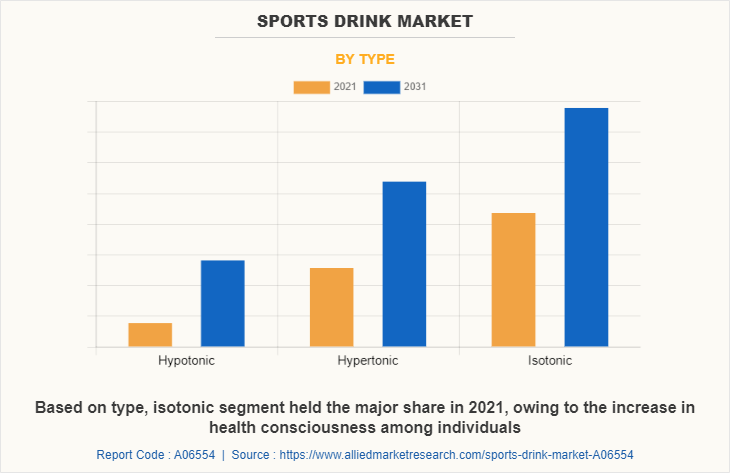
By Type
The isotonic sports drinks segment accounted for more than 45% of the sports drink market share, in terms of revenue, in 2021 as these drinks are being widely consumed & popular among consumers. An isotonic drink is easily absorbed and quickly leaves the stomach for optimal efficiency and better digestion. The main aim of the isotonic drink is to improve the intake of minerals, water, and nutrients, which further helps in enhancing the athlete’s performance. This segment is projected to dominate the market during the forecast period and is anticipated to show significant growth in Asia-Pacific, whereas growth will remain steady in North America.
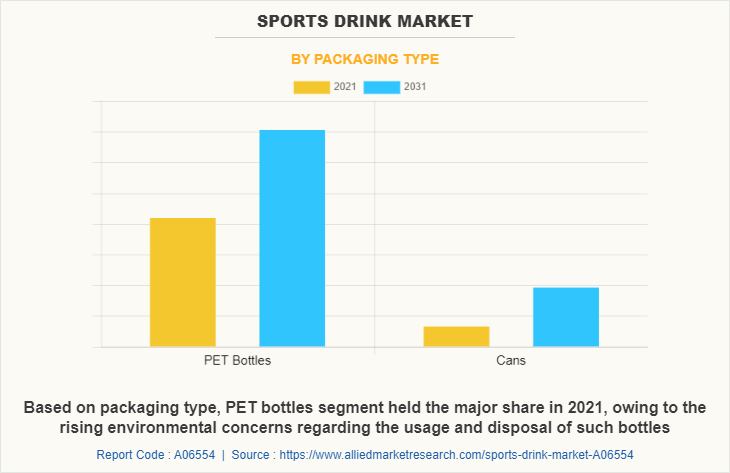
By Packaging
As a packaging type, PET bottle is estimated to witness the highest CAGR of 4.5% during the forecast period. PET bottles were once regarded as the most popular & widely used form of packaging. They tend to be one of the most reusable options. There are numerous ways to keep plastic bottles around and reuse them; thereby, making them a beneficial choice for the environment.
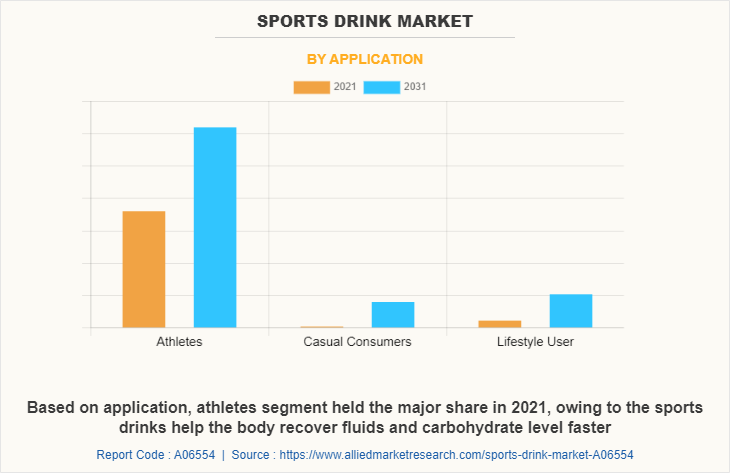
By Application
By application, the athletes segment led the market and accounted for 67.4% of the sports drink market share in 2021 and is expected to maintain its dominance during the forecast period. Athletes make use of a myriad of sports nutrition products to get better results from their workouts and practice sessions. The most used sports nutrition supplements by athletes are isotonic drink powders, sports drinks, protein RTD drinks, tablets, and capsules. The athletes whose sports depend on higher muscle mass particularly consume protein powders and protein drinks which is expected to propel sports drink market demand. The minerals and vitamins from these drinks help in increasing endurance of the body, which helps the athletes increase their performance output.
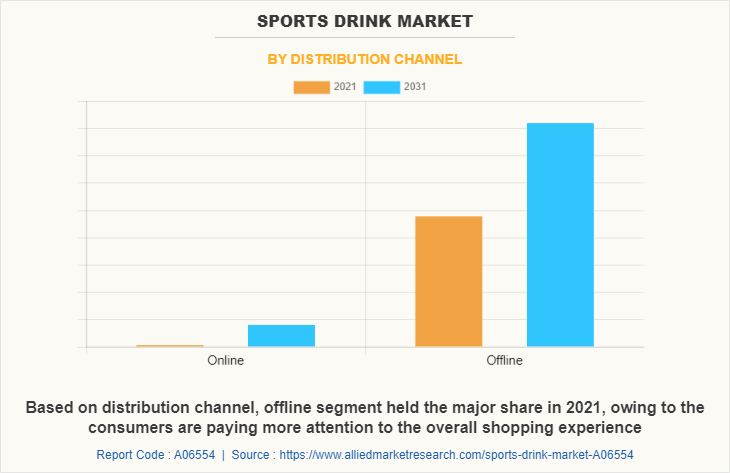
By Distribution Channel
Based on the distribution channel, the offline segment led the sports drinks market and accounted for 84.6% of the market share in 2021 and is expected to maintain its dominance during the forecast period. Hypermarkets & supermarkets usually span a large area and display a wide range of brands in one store. In addition, they are especially located near residential areas for convenience and easy accessibility. Therefore, people majorly prefer to buy beverages from hypermarkets & supermarkets.
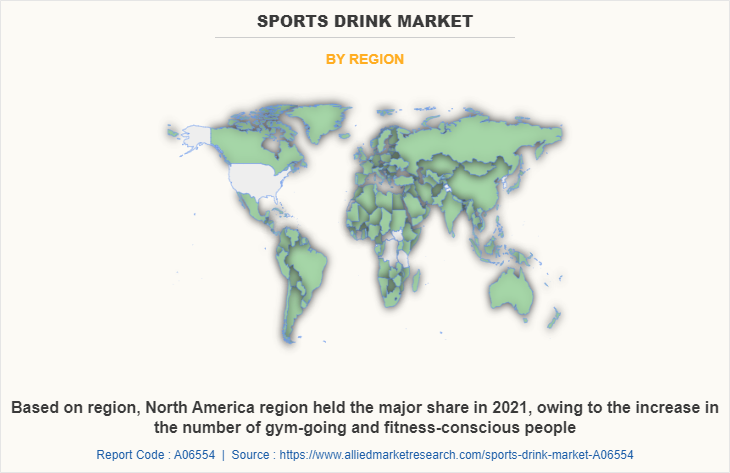
By Region
Region-wise, North America was the largest market in 2021 and had the highest market share of 33.6%. The demand for sports drinks in North America is being driven by an increase in the number of gym-going and fitness-conscious people who want to stay healthy and fit. An increase in the popularity of ’clean label’ and ’free from’ products are leading the way in North America, particularly in the U.S., and is expected to play a significant role in the growth of the sports drink market in the future.
Competitive Analysis
The players in the sports drink market have adopted acquisition, business expansion, partnership, collaboration, and product launch as their key development strategies to increase profitability and improve their position in the market.
Some of the key players profiled in the sports drink market include Abbott, AriZona Beverages USA, Dr Pepper Snapple Group, GNC Holdings, LLC, GU Energy Labs, Jel Sert, Monster Energy Company, Nestlé S.A., PacificHealth Labs., PepsiCo, Inc., Red Bull GmbH, Suntory Holdings Limited, The Coca-Cola Company, The Kraft Heinz Company, and Xtreme Energy Group Limited
Key Benefits For Stakeholders
- This report provides a quantitative analysis of the market segments, current trends, estimations, and dynamics of the sports drink market analysis from 2021 to 2031 to identify the prevailing sports drink market opportunities.
- The market research is offered along with information related to key drivers, restraints, and opportunities.
- Porter's five forces analysis highlights the potency of buyers and suppliers to enable stakeholders make profit-oriented business decisions and strengthen their supplier-buyer network.
- In-depth analysis of the sports drink market segmentation assists to determine the prevailing market opportunities.
- Major countries in each region are mapped according to their revenue contribution to the global market.
- Market player positioning facilitates benchmarking and provides a clear understanding of the present position of the market players.
- The report includes the analysis of the regional as well as global sports drink market trends, key players, market segments, application areas, and market growth strategies.
Sports Drink Market Report Highlights
| Aspects | Details |
| Market Size By 2031 | USD 22 billion |
| Growth Rate | CAGR of 4.8% |
| Forecast period | 2021 - 2031 |
| Report Pages | 315 |
| By Distribution Channel |
|
| By Type |
|
| By Packaging Type |
|
| By Application |
|
| By Region |
|
| Key Market Players | PepsiCo, Inc., The Jel Sert Company, PacificHealth Labs, Suntory Holdings Limited, The Kraft Heinz Company, Xtreme Energy Group Ltd, Abbott Laboratories, GU Energy Labs, Keurig Dr Pepper Inc., The Coca-Cola Company, Red Bull GmbH, Nestle S.A., GNC Holdings, LLC, Monster Beverage Corporation, AriZona Beverages USA, LLC |
Analyst Review
According to the insights of CXOs of leading companies, the increase in the athletic population and sports players in developing countries raises the demand for sports drinks, thereby leading to market growth. Moreover, the growth in interest of the millennials in physical and fitness-related activities is the key factor contributing to the growth of the sports drink market.
With the increase in demand for sports drinks from athletics and lifestyle user, manufacturers are investing more in R&D to cater to this increase in demand. Manufacturers are increasingly incorporating the latest technology to increase production efficiency and quality. Moreover, the rise in demand for natural sports drinks among consumers makes way for manufacturers to come up with natural sports drinks along with affordable prices and eco-friendly packaging.
The global sports drink market size was valued at $13,668.70 million in 2021 and is projected to reach $21,969.70 million by 2031
The global Sports Drink market is projected to grow at a compound annual growth rate of 4.8% from 2022 to 2031 $21,969.70 million by 2031
Some of the key players profiled in the sports drink market include Abbott, AriZona Beverages USA, Dr Pepper Snapple Group, GNC Holdings, LLC, GU Energy Labs, Jel Sert, Monster Energy Company, Nestlé S.A., PacificHealth Labs., PepsiCo, Inc., Red Bull GmbH, Suntory Holdings Limited, The Coca-Cola Company, The Kraft Heinz Company, and Xtreme Energy Group Limited
Region-wise, North America was the largest market in 2021
Growing inclination of the millennial population toward physical and fitness-related activities The expansion of wellness and fitness centers as well as exercise parks Demand for healthier beverage alternatives Rise in the number of athletes and sports persons Rise in buying power of consumers
Loading Table Of Content...



